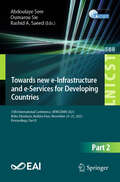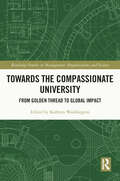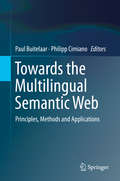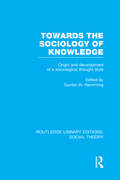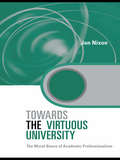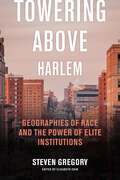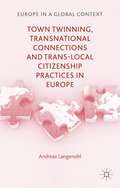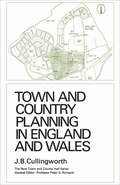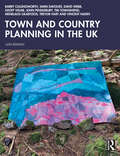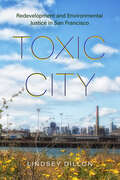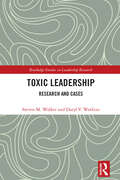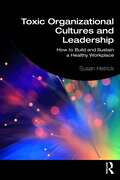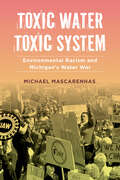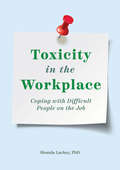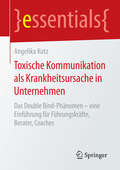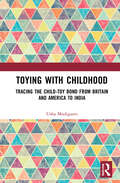- Table View
- List View
Towards new e-Infrastructure and e-Services for Developing Countries: 15th International Conference, AFRICOMM 2023, Bobo-Dioulasso, Burkina Faso, November 23–25, 2023, Proceedings, Part II (Lecture Notes of the Institute for Computer Sciences, Social Informatics and Telecommunications Engineering #588)
by Oumarou Sie Rashid A. Saeed Abdoulaye SereThe two-volume set LNICST 587 + 588 constitutes the refereed proceedings of the EAI 15th International Conference on Africa Internet infrastructure and Services, AFRICOMM 2023, which took place in Bobo-Dioulasso, Burkina Faso, in November 2023. The 59 full papers presented in these two volumes were carefully reviewed and selected from 72 submissions. The papers are organized in the following topical sections: Part I: Digital economy, Digital transformation, e-Government and e-services; ICT infrastructures for critical environmental conditions; Wireless networks; E-health; Cybersecurity and Privacy. Part II: Systems and cloud computing; Artificial Intelligence; Ontology, data preparation; Responsible Artificial Intelligence for Sustainable Development in Africa (workshop).
Towards the Compassionate University: From Golden Thread to Global Impact (Routledge Studies in Management, Organizations and Society)
by Kathryn WaddingtonThis book makes a significant contribution to the need for compassion in the 21st-century neoliberal university. Compassion is a process that involves (i) noticing that suffering is present in an organization; (ii) making meaning of suffering in a way that contributes to a desire to alleviate it; (iii) feeling empathic concern; and (iv) taking action. There is increasing recognition of the crucial role of compassion as a core concern in education, health and social care, and globally to ensure the future sustainability of humankind and the planet. Drawing upon a wide range of interdisciplinary, theoretical, and professional perspectives—including social sciences, modern Darwinism, intersectionality, higher education policy, and organization studies—the book addresses the key challenges facing 21st-century universities. For example, intersectionality and higher education, staff and student health and well-being, and responding to global challenges such as the coronavirus pandemic. The book is relevant to university leaders, policy makers, educators, researchers, university staff, and students aspiring to develop their own understanding of the role of compassion in professional life. It is an important marker of the compassion turn in higher education and what this means for contemporary academic leadership, followership, and pedagogical practice.
Towards the Multilingual Semantic Web
by Paul Buitelaar Philipp CimianoTo date, the relation between multilingualism and the Semantic Web has not yet received enough attention in the research community. One major challenge for the Semantic Web community is to develop architectures, frameworks and systems that can help in overcoming national and language barriers, facilitating equal access to information produced in different cultures and languages. As such, this volume aims at documenting the state-of-the-art with regard to the vision of a Multilingual Semantic Web, in which semantic information will be accessible in and across multiple languages. The Multilingual Semantic Web as envisioned in this volume will support the following functionalities: (1) responding to information needs in any language with regard to semantically structured data available on the Semantic Web and Linked Open Data (LOD) cloud, (2) verbalizing and accessing semantically structured data, ontologies or other conceptualizations in multiple languages, (3) harmonizing, integrating, aggregating, comparing and repurposing semantically structured data across languages and (4) aligning and reconciling ontologies or other conceptualizations across languages. The volume is divided into three main sections: Principles, Methods and Applications. The section on "Principles" discusses models, architectures and methodologies that enrich the current Semantic Web architecture with features necessary to handle multiple languages. The section on "Methods" describes algorithms and approaches for solving key issues related to the construction of the Multilingual Semantic Web. The section on "Applications" describes the use of Multilingual Semantic Web based approaches in the context of several application domains. This volume is essential reading for all academic and industrial researchers who want to embark on this new research field at the intersection of various research topics, including the Semantic Web, Linked Data, natural language processing, computational linguistics, terminology and information retrieval. It will also be of great interest to practitioners who are interested in re-examining their existing infrastructure and methodologies for handling multiple languages in Web applications or information retrieval systems.
Towards the Sociology of Knowledge (RLE Social Theory): Origin and Development of a Sociological Thought Style
by Gunter W. RemmlingThe sociology of knowledge is an area of social scientific investigation with major emphasis on the relations between social life and intellectual activity. It is now an area central to most graduate and undergraduate courses in sociology. The present collection of readings explains the origins, systematic development, present state and possible future direction of the discipline. The major statements in the field were developed early in the twentieth century by Durkheim, Scheler and Mannheim, but the sociology of knowledge continues to engage the theoretical and empirical interests of contemporary sociologists who desire to penetrate the surface level of social existence. This book, with its carefully selected contributions and an introduction which relates the selections to the developmental pattern of the discipline, provides guidance and insight for the reader concerned with the topical issues raised by sociologists of knowledge.
Towards the Virtuous University: The Moral Bases of Academic Practice (Key Issues in Higher Education)
by Jon NixonA good university is invariably assumed to be one which is managerially effective in terms of its economic efficiency, and is judged in terms of entrepreneurialism, self-promotion and competitive innovation. This book argues that in the majority of institutions, these goals are being pursued to the exclusion of academic excellence and public service. It proposes that there is a marked lack of intellectual leadership at senior management level within HE institutions and that academic workers must assume responsibility for the moral purposefulness of their institutions. This will not be a retreat into the old values of an elitist 'ivory tower', but a rejection of the current deeply stratified university system which prematurely selects students for differentiated institutional streams.
Tower and Slab: Histories of Global Mass Housing
by Florian UrbanTower and Slab looks at the contradictory history of the modernist mass housing block - home to millions of city dwellers around the world. Few urban forms have roused as much controversy. While in the United States decades-long criticism caused the demolition of most mass housing projects for the poor, in the booming metropolises of Shanghai and Mumbai remarkably similar developments are being built for the wealthy middle class. While on the surface the modernist apartment block appears universal, it is in fact diverse in its significance and connotations as its many different cultural contexts. Florian Urban studies the history of mass housing in seven narratives: Chicago, Paris, Berlin, Brasilia, Mumbai, Moscow, and Shanghai. Investigating the complex interactions between city planning and social history, Tower and Slab shows how the modernist vision to house the masses in serial blocks succeeded in certain contexts and failed in others. Success and failure, in this respect, refers not only to the original goals – to solve the housing crisis and provide modern standards for the entire society – but equally to changing significance of the housing blocks within the respective societies and their perception by architects, politicians, and inhabitants. These differences show that design is not to blame for mass housing’s mixed record of success. The comparison of the apparently similar projects suggests that triumph or disaster does not depend on a single variable but rather on a complex formula that includes not only form, but also social composition, location within the city, effective maintenance, and a variety of cultural, social, and political factors.
Towering Above Harlem: Geographies of Race and the Power of Elite Institutions
by Steven GregoryCharts racialized and class-based exclusion in Morningside Heights and its surrounding area by elite institutionsNew York City’s storied diversity has also been a story of racialized class discrimination. Towering Above Harlem focuses on understudied players in this process: the elite institutions of Morningside Heights—Columbia University, Teachers College and the Riverside Church—to reveal the troubling ways in which they exploited existing geographic features to build a racially and economically exclusive “city on a hill.”In his final book-length work, Steven Gregory explores the long history of economic and racial discrimination in Morningside Heights, beginning in the late 19th century and extending into the present day. This exclusion of the surrounding racial minorities and working-class population has been enacted physically, through the acquisition of property by Columbia and others, but it has also been enacted through a variety of discourses and practices aimed at setting apart the so-called “civilization-building” mission of the elites overlooking Harlem from the racialized others in the vicinity. The book shows that the major institutions of Morningside Heights have since the beginning tried to physically secede from the Black and Puerto Rican communities geographically below the Morningside plateau, while also symbolically rising above them as beacons of progress. The volume charts the coordinated effort among elites to use space to naturalize relations of power and prestige, illuminating the past, present, and uncertain future of racial discrimination and exclusivity in Morningside Heights and in New York City at large.
Town Twinning, Transnational Connections, and Trans-local Citizenship Practices in Europe
by Andreas LangenohlMany Europeans think that town twinning has greatly contributed to integration in Europe after the Second World War. This book, based on observations and interviews with twinning practitioners in small towns, reveals the social and cultural processes that inform twinning as a transnational practice, its perspectives and its limits.
Town and Country Planning in England and Wales: The Changing Scene (The New Town and County Hall Series #8)
by J. B. CullingworthThe British Town and Country Planning machine is the most sophisticated in the world, yet its inadequacies are only too apparent to those who are familiar with its evolution and operation. During the last decade it has been in a constant state of change in an attempt to come to terms with the needs of a rapidly changing society. This work attempts to provide a comprehensive picture of the planning system and the ways in which it is changing. An historical introduction leads into an account of the machinery of planning and the major new provisions of the 1968 Town and Country Planning Act. Special attention is then paid to the problems of land values, amenity, derelict land, planning for leisure, new and expanding towns, urban renewal and the search for an adequate means of regional planning. The book ends with an examination of some of the fundamental problems of public acceptance of, and public participation in, a democratic system of planning. The book is aimed at the student and the general reader. It is not a legal text, but neither is it intended as a polemic.
Town and Country Planning in the UK
by Barry Cullingworth Simin Davoudi David Webb Geoff Vigar John Pendlebury Tim Townshend Menelaos Gkartzios Trevor Hart Vincent NadinTown and Country Planning in the UK provides one of the most authoritative and comprehensive accounts of British planning history, institutions, legislation, policies, processes and practices. This 16th edition has been substantially revised and re-organised to provide an up-to-date overview of the planning systems in the four nations of the UK, supported by analyses, interpretations, illustrations and examples from planning practice.The new edition features: details of the legislative and policy changes since 2015 and discussion of their implications, including the early stages of the Levelling Up and Regeneration Act, 2023 discussion of environmental policies and programmes and the impact of Brexit on environmental regulatory landscape in Britain changes to climate change and resilience policies, notably the government’s ‘Net Zero’ agenda and their implications for planning updates to the substantive issues in plan-making, especially the responses to the shortage of affordable housing and the development of major infrastructure changes to the processes involved in plan-making and development management an expanded and revised chapter on design to include the growing significance of public health in the built environment major revisions to the chapter on rural planning revisions of the text on planning theory especially in relation to management of conflicts over the use and development of land extended discussion of politics, professionalism and participation in planning The 16th edition of Town and Country Planning in the UK is an ideal starting point for those who are studying or working in the planning field, and for other professionals who need to locate their work in the planning context.
Toxic Beauty: How Cosmetics and Personal-Care Products Endanger Your Health... and What You Can Do About It
by Samuel S. EpsteinSplashy ads and commercials for personal care products are everywhere we turn, promising to keep our appearances fresh and our partners satisfied. But do consumers really know what they're applying to their faces and bodies in their quests for youth and beauty? Do they know the health risks they're taking by simply applying lipstick, face moisturizer or deodorant? Toxic cosmetics and personal care products clutter the shelves at retail stores everywhere, and consumers don't know the avoidable risks they're taking by following a simple beauty regimen. Written by Dr. Samuel S. Epstein, a founder and chairperson of the Cancer Prevention Coalition, Toxic Beauty gives the lowdown on salon safety, health risks hiding in everyday products, how we put our children in danger and more. Toxic Beauty will also educate you and your family on easily implemented solutions through the use of a variety of positive alternatives. Through the help of Dr. Epstein and Toxic Beauty, you can protect yourself from the possible long-term effects of a simple beauty product.
Toxic City: Redevelopment and Environmental Justice in San Francisco
by Lindsey DillonToxic City presents a novel critique of postindustrial green gentrification through a study of Bayview-Hunters Point, a historically Black neighborhood in San Francisco. As cities across the United States clean up and transform contaminated waterfronts and abandoned factories into inviting spaces of urban nature and green living, working-class residents—who previously lived with the effects of state abandonment, corporate divestment, and industrial pollution—are threatened with displacement at the very moment these neighborhoods are cleaned, greened, and revitalized. Lindsey Dillon details how residents of Bayview-Hunters Point have fought for years for toxic cleanup and urban redevelopment to be a reparative process and how their efforts are linked to long-standing struggles for Black community control and self-determination. She argues that environmental racism is part of a long history of harm linked to slavery and its afterlives and concludes that environmental justice can be conceived within a larger project of reparations.
Toxic Communities: Environmental Racism, Industrial Pollution, and Residential Mobility
by Dorceta TaylorUncovers the systemic problems that expose poor communities to environmental hazardsFrom St. Louis to New Orleans, from Baltimore to Oklahoma City, there are poor and minority neighborhoods so beset by pollution that just living in them can be hazardous to your health. Due to entrenched segregation, zoning ordinances that privilege wealthier communities, or because businesses have found the ‘paths of least resistance,’ there are many hazardous waste and toxic facilities in these communities, leading residents to experience health and wellness problems on top of the race and class discrimination most already experience. Taking stock of the recent environmental justice scholarship, Toxic Communities examines the connections among residential segregation, zoning, and exposure to environmental hazards. Renowned environmental sociologist Dorceta Taylor focuses on the locations of hazardous facilities in low-income and minority communities and shows how they have been dumped on, contaminated and exposed.Drawing on an array of historical and contemporary case studies from across the country, Taylor explores controversies over racially-motivated decisions in zoning laws, eminent domain, government regulation (or lack thereof), and urban renewal. She provides a comprehensive overview of the debate over whether or not there is alink between environmental transgressions and discrimination, drawing a clear picture of the state of the environmental justice field today and where it is going. In doing so, she introduces new concepts and theories for understanding environmental racism that will be essential for environmental justice scholars. A fascinating landmark study, Toxic Communities greatly contributes to the study of race, the environment, and space in the contemporary United States.
Toxic Cultures at Work: The Eight Drivers of a Toxic Culture and a Process for Change
by James CannonAround the world and across industries, toxic workplaces are in the news. Taking a holistic approach, this book gives a succinct summary of how toxic cultures develop and shows how they can be remedied with practical takeaways for organisations. Existing books on toxic culture either skim the surface of the latest scandal or take a theoretical approach of limited use to practitioners trying to improve their organisations. Now, organisational development expert James Cannon presents an all-in-one resource based on organisational and individual psychology research that offers actionable suggestions for required change. Cannon provides a framework to understand the complexities of a toxic culture, identifying eight drivers: power, leadership personalities, values, organisation design, formal and informal systems, relations with the external environment and individual systems of motivation and reward. The book also offers a comprehensive toolkit with questionnaires and checklists to manage and achieve cultural change. Professionals and students in organisational psychology, business, and change management, as well as those with an interest in the political and social issues raised by toxic cultures, will appreciate this guide on how to tackle a problem that is much discussed but seldom solved.
Toxic Disruptions: Polycystic Ovary Syndrome in Urban India
by Gauri S. PathakThis book provides a unique ethnographic account of women living with polycystic ovary syndrome (PCOS) in India. It examines how contaminated environments and political–economic changes render urban middle-class women in India vulnerable to PCOS, a condition which has the potential to disrupt conventional, normative feminine biographies of marriage and childbearing. The volume revolves around two main themes: how toxic landscapes, the endocrine disrupting chemicals suffusing them, and the political–economic environments related to them are linked to endocrine disorders such as PCOS; and how the biosocial disruptions caused by PCOS are both affecting women and reflective of changes in contemporary urban India. The author draws on anthropological fieldwork to investigate these connections through a fresh approach, combining a political ecological framework with perspectives from the anthropology of toxic exposures and health–environment systems. The first of its kind, this volume will be indispensable to students and researchers of anthropology, particularly medical anthropology, medical sociology, human geography, science and technology studies, medical humanities, health–environment systems, endocrine disorders, public health, and South Asian studies.
Toxic Leadership: Research and Cases (Routledge Studies in Leadership Research)
by Steven M. Walker Daryl WatkinsToxic Leadership: Research and Cases presents research and cases on toxic leadership that emerged from qualitative research on the followers of toxic leaders. The goal is to help students, researchers, and academics understand how toxic leadership emerges, how leaders can spot toxic leadership within their organizations, and discuss what they can do to stop toxic leaders from destroying organizational value. The book pulls together various theories, models, and names (e.g., bad leadership, destructive leadership) for toxic leadership. The authors cover how power, culture, personality disorders, and followers contribute to the toxic leadership phenomenon. Readers will learn how toxic leaders impact organizations, the types of toxic leaders, signs of toxic leaders, and the environments they create. The authors share case studies for each toxic leader type to illustrate themes, coping strategies, and organizational outcomes. Each case is accompanied by a series of questions for reflection, study, and leadership development. This book will be useful for students, researchers, and academics to help uncover signs of toxic leaders that are often hidden from upper management. It will also be helpful for leaders to develop organizational strategies and for followers to develop coping strategies.
Toxic Leadership: Research and Cases (Routledge Studies in Leadership Research)
by Steven M. Walker Daryl WatkinsToxic Leadership: Research and Cases presents research and cases on toxic leadership that emerged from qualitative research on the followers of toxic leaders. The goal is to help students, researchers, and academics understand how toxic leadership emerges, how leaders can spot toxic leadership within their organizations, and discuss what they can do to stop toxic leaders from destroying organizational value.The book pulls together various theories, models, and names (e.g., bad leadership, destructive leadership) for toxic leadership. The authors cover how power, culture, personality disorders, and followers contribute to the toxic leadership phenomenon. Readers will learn how toxic leaders impact organizations, the types of toxic leaders, signs of toxic leaders, and the environments they create. The authors share case studies for each toxic leader type to illustrate themes, coping strategies, and organizational outcomes. Each case is accompanied by a series of questions for reflection, study, and leadership development.This book will be useful for students, researchers, and academics to help uncover signs of toxic leaders that are often hidden from upper management. It will also be helpful for leaders to develop organizational strategies and for followers to develop coping strategies.
Toxic Organizational Cultures and Leadership: How to Build and Sustain a Healthy Workplace
by Susan HetrickToxic organizational cultures and leadership have led to major reputational failures, with the greatest impact felt by the people who dedicate their careers to working for these organizations. And yet organizations do not become toxic overnight. They do not consciously set out to break rules and regulations, nor do they actively seek wrongdoing. This book defines toxic culture, explains how toxic cultures emerge over time, and provides practical approaches supported by in-depth research for overcoming a toxic culture at the individual, team, and organizational level. Pragmatic and applicable, the book provides a call to action that can be applied in any type of organization. While the role of leadership in toxic cultures is acknowledged, the book sets out four distinct stages to embedding toxic cultures and draws on examples from leading organizations and companies to illustrate each stage. The book then identifies interventions and levers that can be implemented by executives, boards, and HR practitioners to prevent toxicity and to change toxic cultures back to healthy, positive workplaces. Drawing on research and interviews with senior HR leaders and executives, the book provides: An understanding of the four stages of toxic cultures and the impact of performance pressures in driving toxicity An appreciation of the role of senior leadership and personality traits Practical tools and guidance on interventions for practitioners to build and sustain a healthy and positive workplace Senior executives, HR, and organizational development practitioners in local and global organizations spanning a range of industry sectors will find this book invaluable. The book is also highly relevant to consultants working in the field of corporate culture and change.
Toxic Sexual Politics: Toxicology, Environmental Poisons, and Queer Feminist Futures (Health, Society, and Inequality)
by Melina PackerA bold exposé of how the very foundation of toxicology has been contaminated by sexist and racist ideologiesThe first critical understanding of the field of toxicology from a feminist and antiracist perspective, Toxic Sexual Politics asserts that the science of toxicants must be held accountable for the uneven distribution of toxic pollution along racial and sexual lines. Drawing upon in-depth interviews and extensive ethnographic and archival research, including participant observations in toxicology classrooms, conferences, and laboratories, Melina Packer urges environmental health advocates to place toxicant science within its masculinist, militarist, and eugenicist history.Toxic Sexual Politics shows how the founding fathers of U.S. toxicology were ideologically aligned with the chemical industry, inventing a science that could “make chemicals safe,” as opposed to one that could adequately protect planetary health from toxicants’ hazards. While many toxicologists today are critical of the chemical industry, they continue to rely on the highly limited tools of toxicology as accurate measures of toxicity, as do government regulators, the courts, and environmental advocates.Unlike most critiques of the chemical industry and narratives of environmental health movements, Toxic Sexual Politics refuses to take the science at face value. By focusing on the sexist, racist, and ableist biases reinforced by toxicology, Packer powerfully argues that this scientific discipline reproduces the very same white supremacist and heterosexist logics that generated environmental injustices in the first place. The field of toxicology can explicitly confront chemical corporate power by building from queer, feminist, anti-ableist, and antiracist movements for environmental and reproductive justice.
Toxic Shock: A Social History (Biopolitics #6)
by Sharra L. VostralA history of Toxic Shock Syndrome In 1978, doctors in Denver, Colorado observed several healthy children who suddenly and mysteriously developed a serious, life-threatening illness with no visible source. Their condition, which doctors dubbed ‘toxic shock syndrome’ (TSS) was rare, but observed with increasing frequency over the next few years in young women, and was soon learned to be associated with a bacterium and the use of high-absorbency tampons that had only recently gone on the market. In 1980, the Centers for Disease Control identified Rely tampons, produced by Procter & Gamble, as having the greatest association with TSS over every other tampon, and the company withdrew them from the market. To this day, however, women are frequently warned about contracting TSS through tampon use, even though very few cases are diagnosed each year. Historian Sharra Vostral’s Toxic Shock is the first and definitive history of TSS. Vostral shows how commercial interests negatively affected women’s health outcomes; the insufficient testing of the first super-absorbency tampon; how TSS became a ‘women’s disease,’ for which women must constantly monitor their own bodies. Further, Vostral discusses the awkward, veiled and vague ways public health officials and the media discussed the risks of contracting TSS through tampon use because of social taboos around discussing menstruation, and how this has hampered regulatory actions and health communication around TSS, tampon use, and product safety. A study at the intersection of public health and social history, Toxic Shock brings to light the complexities behind a stigmatized and under-discussed issue in women’s reproductive health. Importantly, Vostral warns that as we move forward with more and more joint replacements, implants, and internal medical devices, we must understand the relationship of technology to bacteria and recognize that both can be active agents within the human body. In other words, unexpected consequences and risks of bacteria and technology interacting with each other remain.
Toxic Water, Toxic System: Environmental Racism and Michigan's Water War
by Prof. Michael MascarenhasThe tireless resistance of local communities fighting for ownership of America’s third largest water system Toxic Water, Toxic System exposes the consequences of a seemingly anonymous authoritarian state willing to maintain white supremacy at any cost—including poisoning an entire city and shutting off water to thousands of people. Weaving together narratives of frontline activists along with archival data, Michael Mascarenhas provides a powerful exploration of the political alliances and bureaucratic mechanisms that uphold inequality. Drawing from three years of ethnographic fieldwork in Flint and Detroit, this book amplifies the voices of marginalized communities, particularly African American women, whose perspectives and labor have been consistently overlooked. Toxic Water, Toxic System offers a fresh perspective on the ties between urban austerity policies, environmental harm, and the advancement of white supremacist agendas in predominantly Black and brown cities.
Toxicity in the Workplace: Coping with Difficult People on the Job
by Shonda Lackey PhDNavigating a toxic work environment—a guide to managing difficult colleagues and stressful situations There are everyday challenging work relationships, and then there are situations that go beyond the ordinary—situations that push you to the edge. Written by a clinical psychologist who is knowledgeable about the mental disorders that can cause toxic behavior, Toxicity in the Workplace will help you understand why your difficult colleagues act the way they do and gain practical strategies for negotiating more peaceful, productive solutions. Armed with new insight into your colleagues' behaviors, you will learn pragmatic techniques that will give you the confidence to advocate for yourself and, when needed, remove yourself from uncomfortable situations and conversations. This book about dealing with toxic behavior in the workplace includes: Techniques for everyone—Learn approaches for communication with toxic people at all levels within an organization that are tailored to various problematic behaviors. Understand deeper motivations—Common anxiety, mood, and personality disorders are explained. Learn by example—Vivid case studies illustrate familiar scenes at work and model how you can respond respectfully and assertively. When you're looking for a book about how best to deal with difficult people at work, look no further than Toxicity in the Workplace.
Toxische Kommunikation als Krankheitsursache in Unternehmen: Das Double Bind-Phänomen – eine Einführung für Führungskräfte, Berater, Coaches (essentials)
by Angelika KutzIn diesem essential untersucht Angelika Kutz die Selbstwert-Vernichtungsmaschinerie des toxischen Kommunikations-Musters ,,Double Bind" als mögliche Ursache der meisten psychisch bzw. psychosomatisch bedingten Ausfälle in Unternehmen sowie hilfreiche Gegenmaßnahmen. Ziel der Autorin ist es, die krankheitsfördernden Kommunikations-Strukturen des Double Binds transparent zu machen. Dies dient der Entlastung von Betroffenen und Führungskräften sowie der Unterstützung für Coaches im Beratungskontext, da krankheitsbedingte Fehlzeiten aufgrund psychischer Erkrankungen heute kontinuierlich zunehmen.
Toy Monster: The Big, Bad World of Mattel
by Jerry OppenheimerAn eye-popping, unauthorized exposé of the House of Barbie from the New York Times–bestselling author of The Kardashians and Crazy Rich. From Boise to Beijing, Mattel&’s toys dominate the universe. Its no fun-and-games marketing muscle reaches some 140 countries, and its iconic products have been a part of our culture for generations. Now, in this intriguing and entertaining exposé, New York Times–bestselling author Jerry Oppenheimer places the world&’s largest toy company under a journalistic microscope, uncovering the dark side of toy land, and exploring Mattel&’s oddball corporate culture and eccentric, often bizarre, cast of characters. Based on exclusive interviews and an exhaustive review of public and private records, Toy Monster exposes Mattel&’s take-no-prisoners, shark-infested corporate style. Throughout this scrupulously reported, unauthorized portrait, you&’ll discover how dangerous toys are actually nothing new to Mattel, and why its fearsomely litigious approach within the brutal toy business has helped their products dominate potential rivals such as Bratz. Engaging and accessible, Toy Monster shows you why today&’s toy business isn&’t always fun and games. &“Oppenheimer . . . has now trained his sights on the world&’s biggest toy company—its egos, scandals and flawed products. In his toyland, nothing is cute.&” —The Wall Street Journal &“Oppenheimer takes a tour of Mattel&’s seamier side, highlighting its dubious corporate practices and kooky cast in this scathing portrait . . . Fast-paced and engaging, this exposé will absorb readers until the last page and will forever change the way they think about the company.&” —Publishers Weekly &“Thoroughly researched, beautifully written, Oppenheimer&’s opus contains all the intrigue and drama of an epic novel.&” —C. David Heymann, New York Times–bestselling author
Toying with Childhood: Tracing the Child-Toy Bond from Britain and America to India
by Usha MudigantiThis book studies the dialectic relationship between the image of the child and the toy in literary depictions of childhood in 19th- and 20th- century Anglo-American fiction. Drawing from the psychoanalytic theories of Sigmund Freud, Anna Freud, D.W. Winnicott, and Sudhir Kakar, it analyses themes such as the heterogeneity of childhood and the construction of the ideals of childhood. It explores the linkages between the ideals of childhood in Britain and its travel to America and further dissemination in British India. It discusses the established tropes of childhood such as innocence, a formative period, the centrality of play, and the presence of a toy to argue that the mores of childhood are culturally constructed and lead to the reification of a child into an image of perfection. The author problematises the notion of essential innocence and discusses the repercussions of such stereotypes about childhood. The work also highlights parallels between the ideals of childhood established in 19th-century Britain and the portrayals of postcolonial Indian childhoods in 20th-century Indian English literature. Toying with Childhood will be useful for students and researchers of education, childhood studies, psychology, sociology, literature, gender studies, and development studies. It will also appeal to general readers interested in cultural perceptions of childhood, literary depictions of children, and the works of Sigmund Freud.
